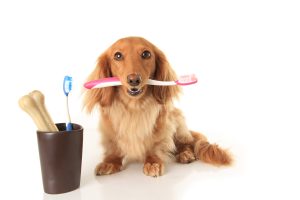
Dental car for dogs is important for their overall health.
The Importance of Dental Care for Dogs: A Key to Overall Health
Many dog owners are diligent about their pets’ diet, exercise, and grooming, but dental care often takes a backseat. However, maintaining your dog’s dental health is crucial, not just for a bright smile, but for their overall well-being. In this blog post, we’ll explore why dental care is important for dogs and how you can effectively manage it.
I get commissions for purchases made through links in this post. As an Amazon Associate, I earn from qualifying purchases. You can read our disclaimer here.
Understanding the Risks of Poor Dental Health
Tooth Decay and Gum Disease:
Just like in humans, plaque and tartar build-up in dogs can lead to tooth decay and gum disease (periodontal disease). This can cause pain, tooth loss, and infections.
Systemic Health Issues:
Poor dental health doesn’t only affect the mouth. Bacteria from the teeth and gums can enter the bloodstream and affect other organs, leading to more serious health issues. You can read more about dog dental issues at Pet MD.
Recognizing Dental Problems in Dogs
Warning Signs:
Bad breath is often the first sign of dental problems. Other indicators include red, swollen gums, difficulty eating, excessive drooling, and loose or missing teeth.
Regular Check-Ups:
Regular veterinary check-ups are vital, as vets can spot dental issues early on. They can also perform professional cleanings and provide specific dental care advice.
Daily Dental Care Practices
Brushing Teeth:
Brushing your dog’s teeth daily with dog-specific toothpaste is the best way to prevent plaque and tartar build-up.
Dental Chews and Toys:
Dental chews and toys can help reduce plaque build-up and keep your dog’s teeth clean, though they should not replace brushing. You can find a wide variety of dental chews on Amazon.
Healthy Diet:
A balanced diet is essential for good dental health. Some specially formulated dog foods can help reduce plaque and tartar.
Professional Dental Cleanings
Anesthesia and Cleaning:
Professional dental cleanings by a veterinarian are usually done under anesthesia. This allows for a thorough cleaning and examination of all the teeth, while not stressing our your dog.
Frequency of Cleanings:
The frequency of professional cleanings depends on your dog’s age, breed, and overall dental health. Your vet can recommend a schedule.
Prevention is Key
Early Intervention:
Addressing dental issues early can prevent more serious health problems. Regular dental care for dogs should be a part of your dog’s health routine from a young age.
Education and Awareness:
Educating yourself about the importance of dental health in dogs is crucial. Understanding the basics can go a long way in preventing dental diseases.
Conclusion
Dental care for dogs is an integral part of a dog’s overall health care. Neglecting it can lead to serious health issues, but with regular care and maintenance, most dental problems in dogs are preventable. Start incorporating dental care into your dog’s daily routine, and consult your veterinarian for professional advice and cleanings. Your dog’s bright smile and fresh breath will thank you!
If your dog struggles with having their teeth brushed, our certified trainers can help! We offer cooperative care training for all dog care needs including teeth brushing. Contact us today to schedule your first session.
